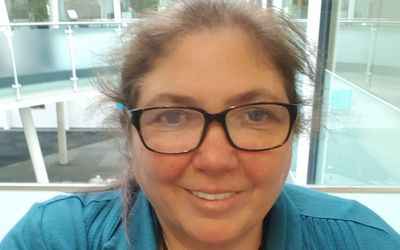You are here
- Home
- External Events and Publications
- Biennial APS Conference
- APS Conference 2023
- Conference programme
- Making online synchronous collaborative learning more accessible for students with sensory impairments
Making online synchronous collaborative learning more accessible for students with sensory impairments
Jo Buxton, The Open University
Email: jo.buxton@open.ac.uk
Presentation
Abstract
This seminar reports on the findings of research conducted at the Open University into the accessibility of collaborative learning events and the barriers to engagement experienced by blind/visually impaired (BVI) students and deaf/hard of hearing (DHH) students.
Taking a Design-Based Research (DBR) approach, five studies were undertaken to identify these barriers and determine potential interventions. These identified online synchronous learning events as providing the most significant barriers. The product of the research, a result of collaborative design by the participants in the study, is a framework for accessible collaborative engagement represented in the form of a software model, the Model for Accessible Collaborative Engagement (MACE).
The studies involved representatives of all stakeholders in the collaborative learning process at the institution: students, tutors, modules teams, academics, support staff, and the student union Disabled Students Group. These studies took the form of an online survey, interviews with staff and students, staff workshops and a collaborative design focus group. With significant representation of the target groups (BVI and DHH) in all studies, and taking an iterative approach to the design, evaluation and construction of the framework model, the studies established that barriers existed in four main categories covering different themes:
- Communications: aural, visual, screen reading and navigation, text/captioning, lip reading and non-verbal, interpretation and third-party, mode control, and synchronisation.
- Emotional and Social Factors: familiarisation, support networks, self-advocacy, opting out, cognitive load, and stress and anxiety.
- Provisioning and Technical Factors: dissemination, speed and pacing, staff training, participation control, group size, technical], and recordings.
- Activity and Session Design: materials (volume of, in-advance, accessible), accessible activities, and session formats.
MACE is designed to be utilised by both students and staff to provide guidance and suggestions on how to identify and acknowledge these barriers and implement interventions to reduce them.
Jo Buxton
Associate Lecturer in Computing and Communications, The Open University
Jo Buxton is an Associate Lecturer in Computing and Communications, and Researcher in Accessibility and Collaborative Learning at the Open University (OU) and has recently completed her PhD at the University’s Institute of Educational Technology. Prior to joining the OU she worked in systems and software development for more than 20 years, working in research and development, and business intelligence/data mining for some major corporations and public bodies.
